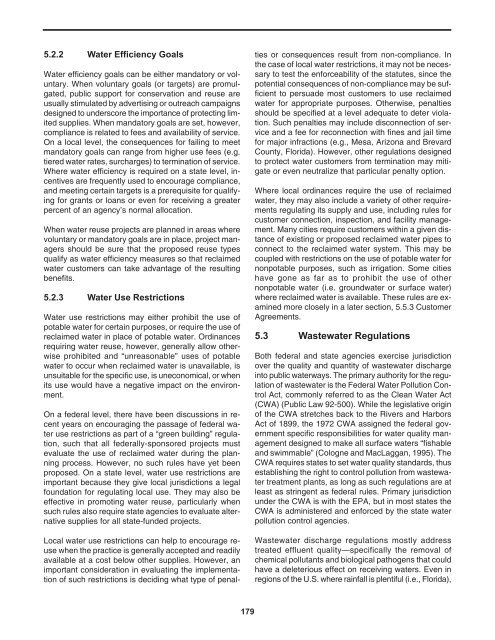o_19f3m1n7k170b14e9u0oqipgu4a.pdf
You also want an ePaper? Increase the reach of your titles
YUMPU automatically turns print PDFs into web optimized ePapers that Google loves.
5.2.2 Water Efficiency Goals<br />
Water efficiency goals can be either mandatory or voluntary.<br />
When voluntary goals (or targets) are promulgated,<br />
public support for conservation and reuse are<br />
usually stimulated by advertising or outreach campaigns<br />
designed to underscore the importance of protecting limited<br />
supplies. When mandatory goals are set, however,<br />
compliance is related to fees and availability of service.<br />
On a local level, the consequences for failing to meet<br />
mandatory goals can range from higher use fees (e.g.<br />
tiered water rates, surcharges) to termination of service.<br />
Where water efficiency is required on a state level, incentives<br />
are frequently used to encourage compliance,<br />
and meeting certain targets is a prerequisite for qualifying<br />
for grants or loans or even for receiving a greater<br />
percent of an agency’s normal allocation.<br />
When water reuse projects are planned in areas where<br />
voluntary or mandatory goals are in place, project managers<br />
should be sure that the proposed reuse types<br />
qualify as water efficiency measures so that reclaimed<br />
water customers can take advantage of the resulting<br />
benefits.<br />
5.2.3 Water Use Restrictions<br />
Water use restrictions may either prohibit the use of<br />
potable water for certain purposes, or require the use of<br />
reclaimed water in place of potable water. Ordinances<br />
requiring water reuse, however, generally allow otherwise<br />
prohibited and “unreasonable” uses of potable<br />
water to occur when reclaimed water is unavailable, is<br />
unsuitable for the specific use, is uneconomical, or when<br />
its use would have a negative impact on the environment.<br />
On a federal level, there have been discussions in recent<br />
years on encouraging the passage of federal water<br />
use restrictions as part of a “green building” regulation,<br />
such that all federally-sponsored projects must<br />
evaluate the use of reclaimed water during the planning<br />
process. However, no such rules have yet been<br />
proposed. On a state level, water use restrictions are<br />
important because they give local jurisdictions a legal<br />
foundation for regulating local use. They may also be<br />
effective in promoting water reuse, particularly when<br />
such rules also require state agencies to evaluate alternative<br />
supplies for all state-funded projects.<br />
Local water use restrictions can help to encourage reuse<br />
when the practice is generally accepted and readily<br />
available at a cost below other supplies. However, an<br />
important consideration in evaluating the implementation<br />
of such restrictions is deciding what type of penalties<br />
or consequences result from non-compliance. In<br />
the case of local water restrictions, it may not be necessary<br />
to test the enforceability of the statutes, since the<br />
potential consequences of non-compliance may be sufficient<br />
to persuade most customers to use reclaimed<br />
water for appropriate purposes. Otherwise, penalties<br />
should be specified at a level adequate to deter violation.<br />
Such penalties may include disconnection of service<br />
and a fee for reconnection with fines and jail time<br />
for major infractions (e.g., Mesa, Arizona and Brevard<br />
County, Florida). However, other regulations designed<br />
to protect water customers from termination may mitigate<br />
or even neutralize that particular penalty option.<br />
Where local ordinances require the use of reclaimed<br />
water, they may also include a variety of other requirements<br />
regulating its supply and use, including rules for<br />
customer connection, inspection, and facility management.<br />
Many cities require customers within a given distance<br />
of existing or proposed reclaimed water pipes to<br />
connect to the reclaimed water system. This may be<br />
coupled with restrictions on the use of potable water for<br />
nonpotable purposes, such as irrigation. Some cities<br />
have gone as far as to prohibit the use of other<br />
nonpotable water (i.e. groundwater or surface water)<br />
where reclaimed water is available. These rules are examined<br />
more closely in a later section, 5.5.3 Customer<br />
Agreements.<br />
5.3 Wastewater Regulations<br />
Both federal and state agencies exercise jurisdiction<br />
over the quality and quantity of wastewater discharge<br />
into public waterways. The primary authority for the regulation<br />
of wastewater is the Federal Water Pollution Control<br />
Act, commonly referred to as the Clean Water Act<br />
(CWA) (Public Law 92-500). While the legislative origin<br />
of the CWA stretches back to the Rivers and Harbors<br />
Act of 1899, the 1972 CWA assigned the federal government<br />
specific responsibilities for water quality management<br />
designed to make all surface waters “fishable<br />
and swimmable” (Cologne and MacLaggan, 1995). The<br />
CWA requires states to set water quality standards, thus<br />
establishing the right to control pollution from wastewater<br />
treatment plants, as long as such regulations are at<br />
least as stringent as federal rules. Primary jurisdiction<br />
under the CWA is with the EPA, but in most states the<br />
CWA is administered and enforced by the state water<br />
pollution control agencies.<br />
Wastewater discharge regulations mostly address<br />
treated effluent quality—specifically the removal of<br />
chemical pollutants and biological pathogens that could<br />
have a deleterious effect on receiving waters. Even in<br />
regions of the U.S. where rainfall is plentiful (i.e., Florida),<br />
179



